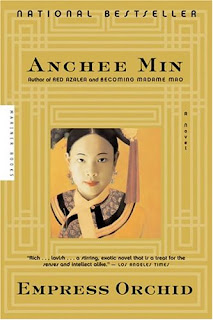Empress Orchid
Summary (from the publisher): The setting is China's Forbidden City in the last days of its imperial glory, a vast complex of palaces and gardens run by thousands of eunuchs and encircled by a wall in the center of Peking. In this highly ordered place - tradition-bound, ruled by strict etiquette, rife with political and erotic tension - the Emperor, The Son of Heaven, performs two duties: he must rule the court and conceive an heir. To achieve the latter, tradition provides a stupendous hierarchy of hundreds of wives and concubines.
It is as a minor concubine that the beautiful Tzu Hsi, known as Orchid as a girl, enters the Forbidden City at the age of seventeen.
It is not a good time to enter the city. The Ch'ing Dynasty in 1852 has lost its vitality, and the court has become an insular, xenophobic place. A few short decades earlier, China lost the Opium Wars, and it has done little since to strengthen its defenses or improve diplomatic ties. Instead, the inner circle has turned further inward, naively confident that its troubles are past and the glory of China will keep the "barbarians" - the outsiders - at bay.
Within the walls of the Forbidden City the consequences of a misstep are deadly. As one of hundreds of women vying for the attention of the Emperor, Orchid soon discovers that she must take matters into her own hands. After training herself in the art of pleasing a man, she bribes her way into the royal bedchamber and seduces the monarch. A grand love affair ensues; the Emperor is a troubled man, but their love is passionate and genuine. Orchid has the great good fortune to bear him a son. Elevated to the rank of Empress, she still must struggle to maintain her position and the right to raise her own child. With the death of the Emperor comes a palace coup that ultimately thrusts Orchid into power, although only as regent until her son's maturity. Now she must rule China as its walls tumble around her, and she alone seems capable of holding the country together.
Review: Empress Orchid tells the story of China's last empress, from her point of view. Orchid was raised in poverty as the daughter of a minor noble but rises to become one of one of the concubines living in the Forbidden City. After earning the emperor's trust, she has his son and her fortunes continue to rise.
It was hard for me to suspend my disbelief entirely while reading this, because most historical accounts portray Orchid, or Tzu Hsi, as an evil villain. However, it is clear that she was brilliant and was the reason China's Empire was able to survive during her lifetime. Additionally, I was somewhat confused about protocol in China - namely in the selection of royal concubines. Orchid seems totally unsurprised that, not only is she selected as one of the 3,000 concubines, but that she is picked to be one of the top 8 - or a wife of the emperor. It seemed surprising to me that she was selected as a wife, based on her family background, but then I don't know enough about how the court worked to really understand. I was also curious about what happened to the rest of the concubines, and would have liked to have seen more about the jealousies and rivalries between them (although you certainly saw that between Orchid and the head concubine Nuharoo).
It was sad to read about China in its decline and as Europe encroaches on its borders. Most of the book deals with political stress and the emperor's health declines as his empire is stolen from him. Orchid's tale would have been far more boring if she had been restricted to living her life alone in her palace as concubines were technically supposed to do. Instead, she becomes crucial to the continuation of the empire (and her son's inheritance) as she steps in to deal with important state decisions.
Orchid's story does not conclude with this story. I'd be interested to see how her life progresses in the sequel to this novel, as Orchid rules as regent for her son after her husband's death.
Stars: 3



Comments
Post a Comment